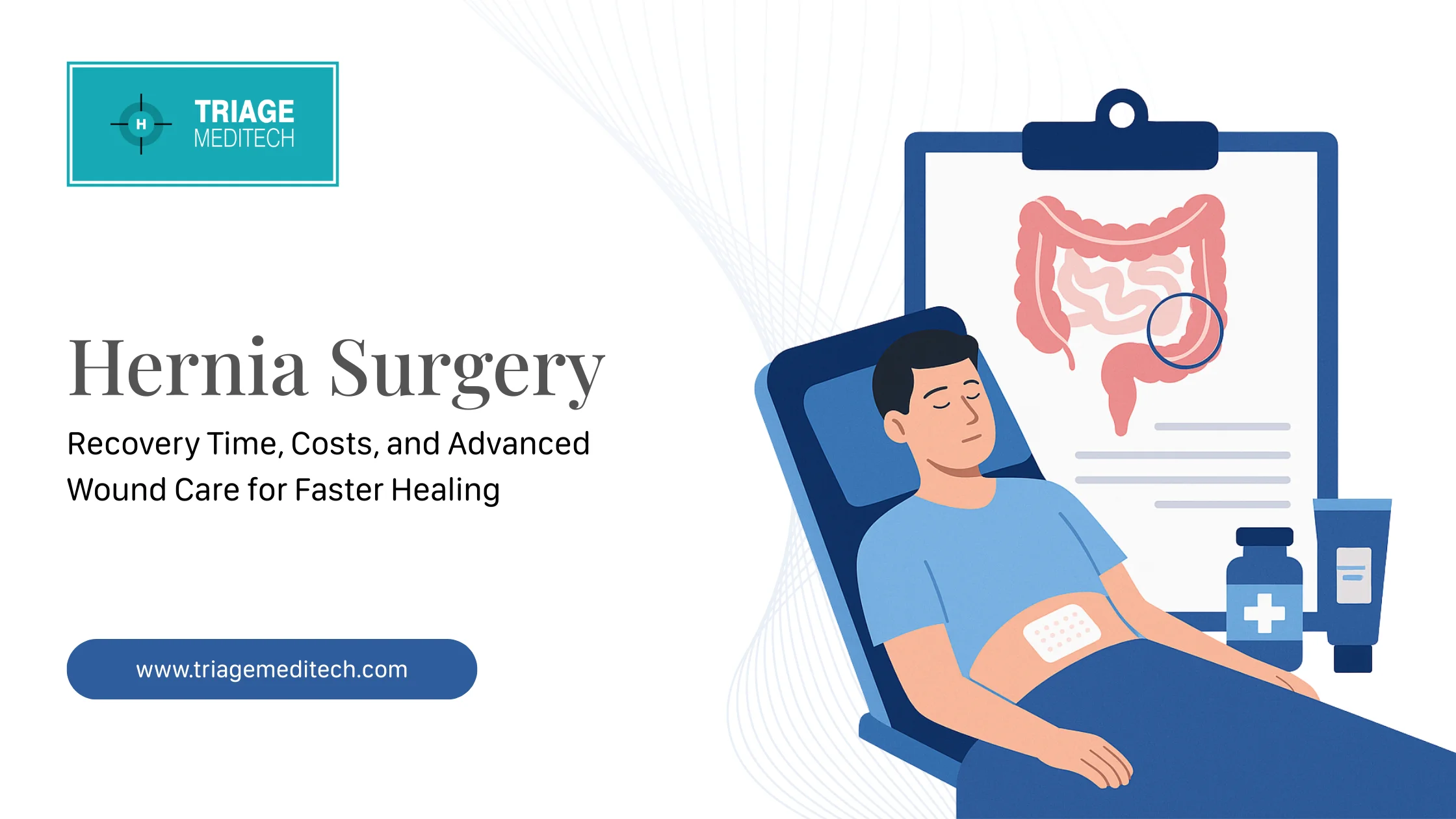A hernia is a common medical condition that affects millions of people around the world. Thanks to advances in surgical techniques and wound care technology, hernia repair surgery has become safer, faster, and more effective.
In this detailed guide, we’ll explore what happens before and after hernia surgery, the expected hernia surgery recovery time, costs in India, and how innovative products from Triage Meditech can help improve healing outcomes.
What is a Hernia?
A hernia occurs when an internal organ or tissue pushes through a weak spot in the surrounding muscles or connective tissue. Most hernias happen in the abdomen but can also appear in the groin or diaphragm.
Common Types of Hernias
To choose the right treatment for your hernia, it’s important to know the type of hernia:
- Inguinal Hernia – in the groin area; most common.
- Umbilical Hernia – near the belly button.
- Hiatal Hernia – part of the stomach moves up into the chest.
- Femoral Hernia – lower abdomen or upper thigh.
- Incisional Hernia – at the site of a previous surgical incision.
What Causes Hernias?
A hernia occurs when pressure inside the body pushes an organ or tissue through a weak spot in the surrounding muscles or connective tissue. This weakness can be present at birth or develop over time due to strain or injury. Common causes of hernias include lifting heavy objects without proper technique, obesity, pregnancy, chronic coughing or sneezing, and straining during bowel movements. Factors like aging, previous surgeries, or genetic predisposition can also weaken the abdominal wall, making it more susceptible to hernias. Understanding these causes can help in preventing hernias or recognizing them early. Risk factors include:
- Heavy lifting
- Obesity
- Pregnancy
- Chronic coughing or sneezing
- Constipation or straining during bowel movements
- Aging or previous surgeries
Symptoms and Diagnosis
Symptoms:
- Visible bulge in the affected area
- Whenever you lift, bend, or cough, you may feel discomfort or pain
- Burning or aching sensation
- Heartburn or difficulty swallowing (hiatal hernia)
Diagnosis:
Doctors usually diagnose hernias during a physical examination. Imaging tests, such as ultrasound, CT scan, or MRI, can be helpful in complex cases.
When is Hernia Surgery Required?
Not all hernias need immediate surgery. If the hernia is small, painless, and doesn’t grow, doctors may recommend monitoring and lifestyle changes.
However, hernia repair surgery becomes necessary when:
- The hernia causes significant pain.
- The bulge increases in size.
- You experience nausea, vomiting, or fever (signs of strangulation).
- The hernia becomes stuck or obstructs bowel movements.
Hernia Surgery Options
Modern surgical techniques allow for safe and effective hernia repair with shorter recovery times.
1. Open Hernia Surgery
- Traditional method with a larger incision.
- A stitch or mesh is used to reinforce the area after the surgeon has pushed the tissue back.
2. Laparoscopic Hernia Surgery
- Minimally invasive with small incisions and a camera.
- Compared to open surgery, there is less pain and faster recovery.
3. Robotic-Assisted Hernia Surgery
- Advanced technology with enhanced precision.
- Ideal for complex or recurrent hernias.
Preparing for Hernia Surgery
- Complete any required blood tests and imaging.
- Stop eating and drinking 8–12 hours before the procedure.
- Arrange help for post-surgery care and rest at home.
Hernia Surgery Recovery: What to Expect
Recovery from hernia surgery depends on the type of surgery and individual health conditions. Here’s what patients can typically expect:
Hernia Surgery Recovery Time
- Laparoscopic surgery: ~1–2 weeks.
- Open surgery: ~4–6 weeks.
- Most patients can walk a few hours after the operation, which promotes healing.
- Returning to light work: usually within 1–2 weeks.
Before and After Hernia Surgery
- Before surgery: A visible bulge and discomfort.
- After surgery: Flatter stomach, reduced pain, and improved mobility.
Patients may experience mild bruising, swelling, or soreness around the incision site. These symptoms usually resolve within a few days.
Hernia Surgery Cost in India
It depends on the surgeon’s expertise and the hospital where the surgery is performed, as well as the type of surgery that is performed, and how much the hernia surgery will cost in India.
| Procedure | Estimated Cost (INR) |
| Open Hernia Surgery | ₹50,000 – ₹80,000 |
| Laparoscopic Hernia Surgery | ₹70,000 – ₹1,20,000 |
| Robotic-Assisted Hernia Repair | ₹1,50,000 and above |
Most insurance policies cover hernia repair. Always confirm with your provider before surgery.
Advanced Wound Care with Triage Meditech
Post-operative care plays a crucial role in recovery, especially for patients with risk factors like diabetes, obesity, or prior wound complications. Triage Meditech offers cutting-edge solutions that enhance wound healing after surgeries, including hernia repair.
CYCLOTHERA™ & CYCLOTHERA™ Plus: Negative Pressure Wound Therapy (NPWT)
These portable NPWT devices:
- Remove excess fluids and infectious material.
- Promote tissue regeneration.
- Reduce the risk of infection.
- Improve oxygenation and blood flow to the surgical site.
Other Innovative Wound Care Products
- Advanced Wound Care Dressings – Advanced wound dressings to protect and heal surgical incisions.
- VACUPORT™ – The Dynamic Incision Management System, promotes wound healing through controlled negative pressure.
- FOAM DRESSINGS – Effective for surgical wounds and pressure ulcers.
The effectiveness and reliability of these products have earned them the trust of healthcare professionals around the world.
FAQs About Hernia Surgery
What does the stomach look like before and after hernia surgery?
Before surgery, the stomach may appear bulged or misshaped at the hernia site. After hernia repair, the stomach looks flatter, and the protrusion is resolved, improving both function and appearance.
Is hernia surgery dangerous?
Hernia surgery is considered safe and routine. Complications are rare but can include infection, recurrence, or mesh-related issues. Choosing an experienced surgeon and following post-op care guidelines minimizes risks.
How soon can I walk after hernia surgery?
Most patients are encouraged to walk within a few hours of the procedure. Walking improves circulation, reduces the risk of blood clots, and accelerates recovery.
How long does hernia surgery take?
The procedure generally takes 30–90 minutes, depending on the complexity and technique used.
How long does it take to recover from hernia surgery?
Recovery time varies:
- Laparoscopic surgery: 1–2 weeks.
- Open surgery: 4–6 weeks.
Most patients resume normal activities within a few weeks, though strenuous exercise may require more time.
Conclusion: A Faster, Safer Path to Recovery
Hernia repair surgery today is more effective and less disruptive than ever. With minimally invasive techniques, shorter hernia surgery recovery times, and advanced wound care options like NPWT from Triage Meditech, patients can expect better outcomes and quicker return to daily life.
If you or a loved one is considering hernia surgery, consult your doctor, understand your options, and don’t forget to discuss wound care solutions to optimize healing.
For more information about advanced wound care products like CYCLOTHERA™, contact Triage Meditech today and take the next step toward a healthier, faster recovery!

